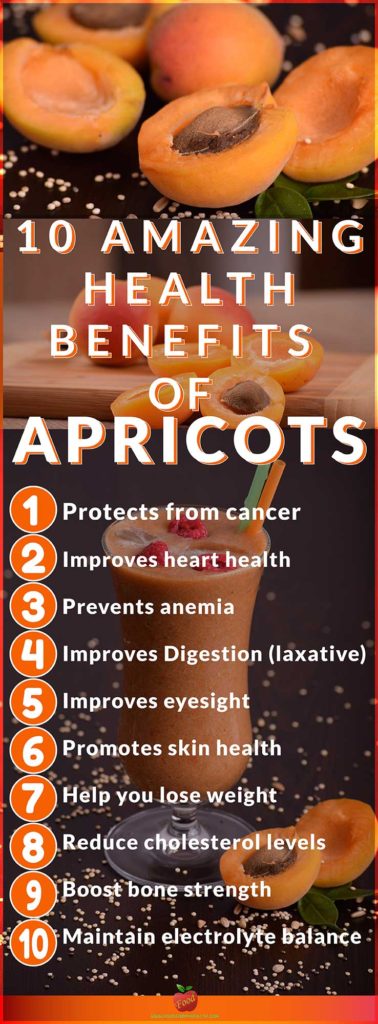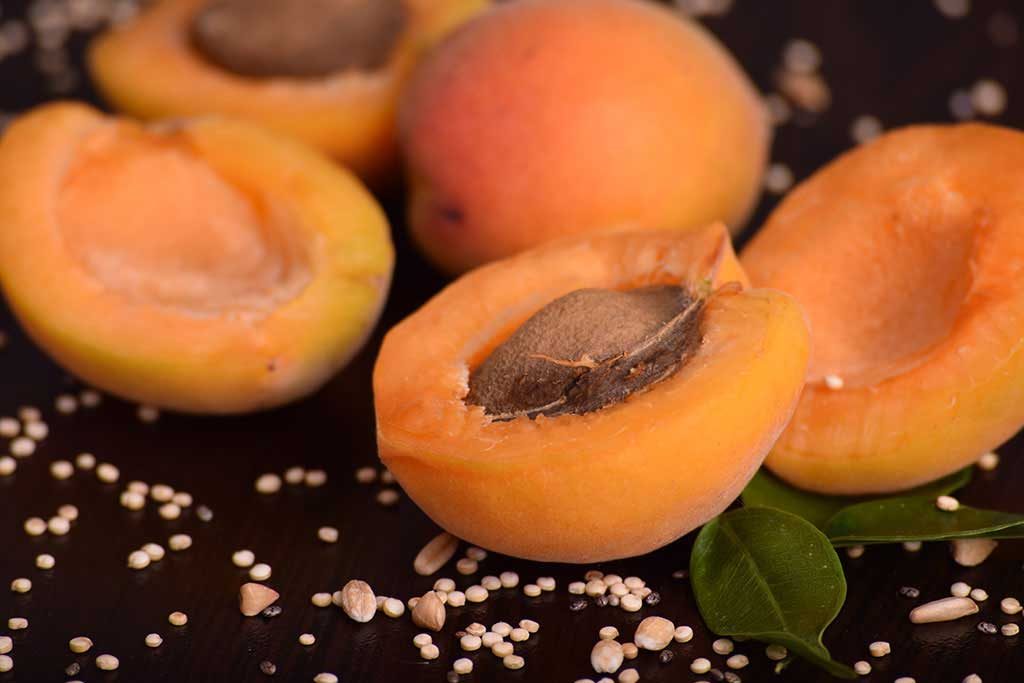10 Amazing Health Benefits of Apricot
Apricot is fruit that give sparkle and beauty to your eyes and is famous as one of the most known traveled trees.
Its center of origin is China from where apricot tree spreads to India and in Europe was brought by Alexander the Great on the return from his conquests in India. From where it passed to Rome, from where its cultivation spread throughout the Mediterranean region. In the 18th century it was taken to North America, where it acclimated to California and states along the Mississippi River.

The apricot is now cultivated in temperate regions on every continent, especially in the Mediterranean. The apricot is a small tree, 8–12 m (26–39 ft) tall, with a trunk up to 40 cm (16 in) in diameter and a dense, spreading canopy and the average lifespan of an apricot tree is 15 to 20 years.
Apricots are usually eaten with the skin. Because of this, the ideal is to eat those grown organically to avoid ingesting chemical products such as pesticides that impregnate the skin and are difficult to remove even by thorough washing.
Its attractive orange color, its pleasant aroma, and its delicious sweetness have made die apricot one of the favorite fruits of the summer season.
The impressive health benefits of apricots are due to the content of vitamins, besides being delicious, dried apricots are a good source of provitamin A because of their richness in beta-carotene.

Dried apricots and marmalade allow this pleasure to last through the winter, as well.

Apricot composition:
The apricots are sweet to taste and used in the preparation of jams, jellies, squashes. The fact that the apricot has low calorie content (about 48 kcal/100 g) makes it an excellent part of weight-loss diets. It has an alkalizing effect because of its richness in alkaline mineral salts. It is particularly noted for its low sodium content and its high levels of potassium. It contains various trace elements of great physiological importance, such as manganese, fluorine, cobalt, and boron. It is rich in sugars (fructose and glucose).
Dried apricots are an important source of protein (up to 5%). They also are an important source of iron, one of their principal minerals.
However, the most important component of apricots, whether fresh or dried, is beta-carotene or provitamin A
They are particularly beneficial in the following cases:
Diseases of the eye: Consumption of apricots maintains vision in good condition and gives the sparkle and beauty to the eyes that are characteristic of good health. This is not due exclusively to the action of provitamin A, but also to the combined action of other vitamins and minerals that accompany it.
Apricots are recommended in cases of conjunctival dryness, chronic irritation or itching of the conjunctiva, loss of visual acuity due to retinal atrophy, and night blindness.
Anemia (due to lack of iron): The iron content of fresh apricots is not significant, whereas it is in the dried fruit. For reasons that are not well understood, the results achieved through their use in the treatment of anemia are far superior to those that would be expected given their low proportion of iron. This may be because of the presence of other substances in apricots that facilitate the absorption of iron.
That it has been experimentally proven that apricot treatment provides results similar to those or beef liver in cases of anemia due to loss of blood.
The amounts of provitamin A and iron found in apricots are actually quite small compared to the large doses that pharmaceutical preparations may contain. In spite of this, the results obtained from regular consumption of this fruit are superior to those to be expected from their content of iron and provitamin A.
This is one of the most surprising facts in nutrition science. It has been scientifically explained only in the last few years. The happy combination of vitamins, minerals, and other chemical substances present in natural foods enhances their action. The results obtained by the use of natural whole foods are superior to those obtained by their isolated and purified components as found in pharmaceutical preparations.
Disorders of the skin: due to their content of provitamin A. Apricots increase resistance to infections. They are recommended for chronic pharyngitis, sinusitis, and eczema.
Nervous disorders: The apricot’s properties of maintaining equilibrium within the nervous system and recommends it in cases of asthenia, depression, nervousness, and lack of appetite. These effects are attributed to the apricot’s richness in trace elements.
Digestive disorders: Fresh, ripe apricots are slightly astringent, while dried apricots are laxative.

What are apricot kernels?
An apricot kernel is the seed of an apricot and it’s similar in appearance to as a small almond. Fresh apricot kernels are white. The skin becomes light brown when dried out. They contain protein, fiber, and a high percentage of oil, which people can extract from the kernel.
What is Laetrile?
Laetrile is the commercial label for apricot kernels (it also goes by name amygdalin or vitamin B17)
Can they help fight cancer?
Apricot kernels may have some health benefits, and some people have suggested that they may help fight cancer.
Scientists have proposed that a compound called amygdalin, present in apricot kernels, may be a way to eradicate tumors and prevent cancer by stopping cells from reproducing.
Pin Us On Pinterest

Related: 10 Amazing Health Benefits of Peaches

